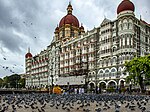Nariman House

The Nariman House, designated as a Chabad house (Hebrew: בית חב"ד, romanized: Beit Chabad), is a five-storey landmark in the Colaba area of South Mumbai, Maharashtra, India. The building was home to a Chabad house, a Hasidic Jewish outreach centre run by Gavriel and Rivka Holtzberg, who had owned the building since around 2006. The centre had an educational center, a synagogue, offered drug prevention services, and a hostel. The building was attacked during the November 2008 Mumbai attacks and six of its occupants, including Holtzberg and his wife, who was six months pregnant, were killed. Their two-year-old son Moshe survived the attack after being rescued by his Indian nanny, Sandra Samuel.
Excerpt from the Wikipedia article Nariman House (License: CC BY-SA 3.0, Authors, Images).Nariman House
Pestonji Lane, Mumbai Zone 1 (Mumbai)
Geographical coordinates (GPS) Address Nearby Places Show on map
Geographical coordinates (GPS)
| Latitude | Longitude |
|---|---|
| N 18.916517 ° | E 72.827682 ° |
Address
Pestonji Lane
Pestonji Lane
400005 Mumbai, Zone 1 (Mumbai)
Maharashtra, India
Open on Google Maps








